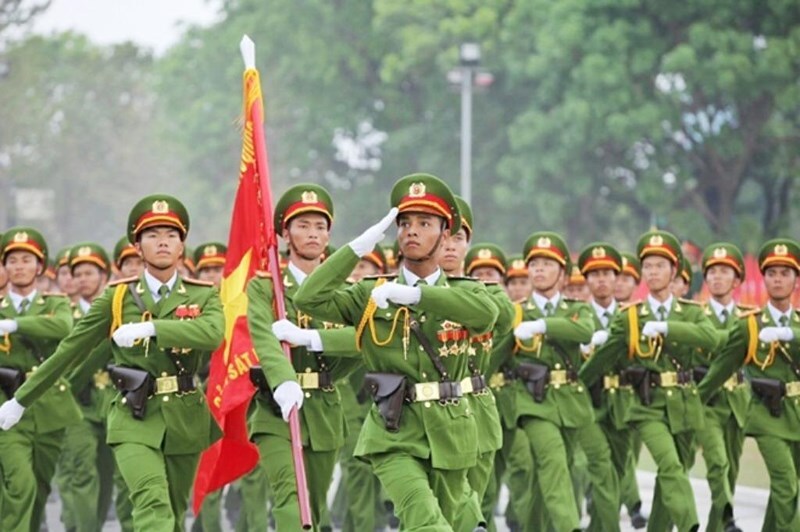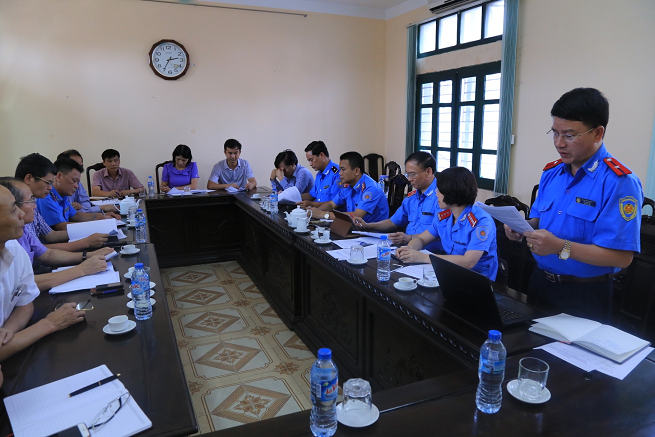The People's Public Security (revised) Law has just been passed by the National Assembly, adding many new points. Of particular interest is the regulation on the rank system for officers, non-commissioned officers, and soldiers of the People's Public Security. Compared to the People's Public Security Law of 2005 (currently in effect), the promotion and granting of ranks have undergone many changes, including for students and graduates of the People's Public Security schools.

Outstanding graduates will be promoted ahead of schedule
The 2005 People's Public Security Act stipulates: “University graduates from People's Public Security schools are conferred the rank of Second Lieutenant; those graduating from intermediate-level schools are conferred the rank of Sergeant.” The law does not stipulate rank promotion in cases of outstanding graduation; however, in the implementing guidelines, those who graduate with excellence or distinction may be promoted one year ahead of schedule.
Article 21 of the amended People's Public Security Act has adjusted this content. Students from Public Security schools upon graduation are conferred ranks as follows: intermediate level is conferred the rank of Sergeant; associate degree is conferred the rank of Senior Sergeant; bachelor's degree is conferred the rank of Second Lieutenant. In cases of outstanding graduation, they are conferred one rank higher. Thus, intermediate-level Public Security graduates with excellence are conferred the rank of Senior Sergeant; associate degree graduates with excellence are conferred the rank of Second Lieutenant; bachelor's degree graduates with excellence are conferred the rank of First Lieutenant.
These regulations aim to encourage students' learning efforts. For a long time, the program at Public Security academies has been 5 years, while universities only 4 years, so academy graduates have been at a disadvantage because their rank remains Second Lieutenant the same as university graduates who study for 4 years. Now, the training program at the academies has also been shortened to 4 years, and excellent graduates are directly promoted to First Lieutenant, surpassing 3 years (whereas under normal conditions it used to take 7 years, including 5 years of study and 2 years by seniority).
According to the Ministry of Education and Training's regulations, excellence is defined as having a cumulative GPA from 9.0 to 10. Due to the heavy emphasis on political theory and operations in Public Security schools' programs, it is very difficult for students to achieve this GPA. Meanwhile, a score of 9.0 is not too difficult for students in mathematics, informatics, and foreign languages faculties at Public Security schools, hence this will be a significant advantage for these students to achieve the rank of First Lieutenant right after graduation. In another aspect, many students reported that due to training requirements, grading in academies is much more stringent compared to intermediate and associate-level schools, so associate and intermediate students have a greater advantage in obtaining distinction or excellence.
Reducing the number of officer ranks at the general level
As required by the Politburo, the promotion and conferral of general-level officer ranks must ensure rigor and scientific basis, only conferring and promoting general-level officer ranks in genuinely important positions. Therefore, the amended People's Public Security Act has tightened conditions and positions eligible for promotion and conferral of general-level officer ranks. For the rank of Major General, it only applies to officers holding the positions of Department Head and equivalents of important departments concerning advisory, political, and operational activities. The department heads of departments such as the Department of Logistics, the General Inspectorate of the General Department, and the Standing Office of the Human Rights Steering Committee are conferred the highest rank of Colonel.
For the rank of Lieutenant General, it only applies to positions including: General Director, Commander, Commissar, Director of the Institute of Strategy, Chief Inspector, Director of Hanoi Police, Ho Chi Minh City Police, Directors of security, political, police academies, Heads of 6 departments under the Ministry (Cybersecurity; Traffic Police; Fire and Rescue Police; Foreign Affairs; Legal and Administrative Reform, Judicial; Building the movement to protect national security) and one Deputy General Director who is the Secretary or Deputy Secretary of the Party Committee. Thus, each General Department has a maximum of two Lieutenant Generals.
This law specifies the number of deputies holding general-level ranks. Specifically, for the position of Deputy Minister, the maximum rank of Senior Lieutenant General is 6. For deputy positions holding the rank of Major General, it is specified as follows: Deputy General Director has a maximum of 5 Major Generals (along with 1 Lieutenant General as previously mentioned); Deputy Commander of the Mobile Police Command has a maximum of 4 Major Generals; Deputy Commissar of the Mobile Police Command is 1 Major General; Deputy Commander of the Protection Command has a maximum of 4 Major Generals; Deputy Chief of the Office of the Ministry of Public Security has a maximum of 3 Major Generals; Deputy Chief Inspector has a maximum of 3 Major Generals; Deputy Director of the Institute of Public Security Science and Strategy has a maximum of 3 Major Generals; Deputy Heads of departments under the Ministry have a maximum of 2 Major Generals; Deputy Directors of the security, political, police academies, each unit has a maximum of 3 Major Generals; Deputy Directors of Hanoi Police and Ho Chi Minh City Police, each unit has a maximum of 3 Major Generals.
The amended People's Public Security Act does not stipulate the general-level rank for officers holding positions in local Public Security (except for Hanoi and Ho Chi Minh City). The previous draft stipulated that Directors of the Public Security of 6 localities including Hai Phong, Da Nang, Can Tho, Nghe An, Thanh Hoa, Dong Nai have the maximum rank of Major General. To align with the rank system in the People's Army, the National Assembly decided that the Directors of Public Security and Chiefs of the Military Commands of 61 provinces and cities all have the maximum rank of Colonel. To ensure uniformity, the rank of Chief of district and district-level police (including Hanoi and Ho Chi Minh City) and department heads is reduced by 1 rank compared to the current law, with the highest rank being Lieutenant Colonel (currently Colonel).
The period for rank promotion among non-commissioned officers, junior officers, and senior officers remains the same as in the 2005 People's Public Security Act. For general ranks, the 2005 People's Public Security Act did not specify the promotion period. This law has adjusted to specify the period for promotion from Colonel to Major General as 4 years, and the minimum period for promotion within each general rank is 4 years. The age for officers eligible for promotion from Colonel to Major General is not over 57, with exceptions as per regulations by the competent authorities of the Communist Party of Vietnam.
For positions within the Central Public Security Party Committee's Inspection Committee, under Clause 2, Article 24 of the People's Public Security Act, only the standing Deputy Chief Inspector and specialized Deputy Chief Inspector are eligible for general-level ranks. Thus, the highest rank for members of the Inspection Committee is Colonel (currently Major General).
Removing the provision on "especially important units and key areas."
The 2005 People's Public Security Act stipulates, “Officers holding essential positions in units tasked with especially important missions or in areas with key positions in terms of security and order may have the highest rank one rank higher than for equivalent positions.” In practice, it is very difficult to quantify what constitutes an especially important unit or key area as each aspect has different perspectives. Therefore, this provision is removed in the current law. This means that the rank cap is uniformly applied to all units and localities, with no exceptions for "special cases to be higher by one rank."
Specific provisions on the rank of seconded Public Security officers
The 2005 People's Public Security Act only provides general provisions without specifying promotion or highest rank applicable to seconded Public Security officers. For a long time, seconded Public Security and Military officers holding positions such as in the National Defense and Security Committee of the National Assembly were not considered for rank promotion. Recently, this inadequacy has been adjusted. Clause 3, Article 24 of the amended People's Public Security Act has concretized this content. Seconded Public Security officers who are standing members of the National Defense and Security Committee of the National Assembly or appointed to positions equivalent to General Director have the highest rank of Major General. Seconded officers who are Deputy Chairpersons of the National Defense and Security Committee of the National Assembly or appointed to the position of Deputy Minister or equivalent have the highest rank of Lieutenant General. Higher-ranked seconded officers may be promoted to general ranks following the regulations of the competent authorities of the Communist Party of Vietnam.
This law takes effect from July 1, 2015. Provisions on general-level rank promotion, demotion, and rank stripping take effect from the date the law is promulgated. The promulgation of the law is under the authority of the President, after the law has been passed.
Source: Cand.com.vn
 Article table of contents
Article table of contents
![[InfoGraphic] 6 forms of discipline for officials and public employees under Decree 71/2016/ND-CP](https://cdn.lawnet.vn//uploads/NewsThumbnail/2016/07/12/1319291-01.png)




.Medium.png)
.Medium.png)
.Medium.png)
.Medium.png)
